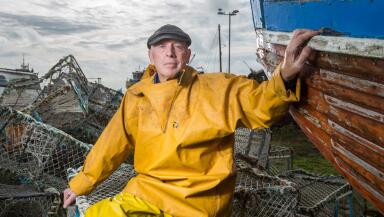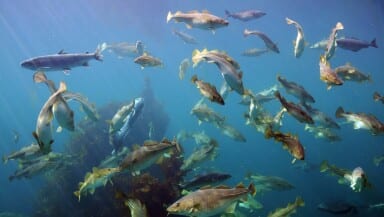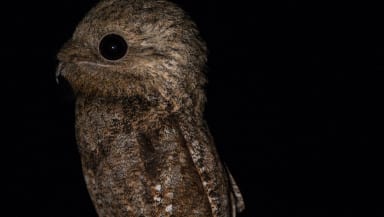First off, let’s address the blue whale in the room. Why is Greenpeace supporting fishing? Shouldn’t environmentalists be supporting a plant-based diet?
Well, yes, eating less meat and dairy, is definitely a great way to help the environment. But so is buying food produced locally. Supporting small-scale, sustainable fishing communities can stop the oceans from being emptied by industrial fishing – and boost local economies that have been forgotten for decades.
What’s the deal with industrial fishing?
Industrial fishing and small-scale fishing are completely different. Industrial fishing is one of the major drivers of the oceans crisis – which in turn is driving the climate crisis. Small-scale fishing generally uses sustainable practices that can help restore ocean life.
Industrial fishing practices by enormous ships are overfishing our oceans. Industrial supertrawlers catch hundreds of tonnes of fish every day – mostly of the same few species. This drastically reduces fish stocks.
This industry relies on a huge global supply chain. They catch fish in one country’s waters, and process them in another, before they’re sold elsewhere. This doesn’t fairly give back to the community it takes from. And as coronavirus has shown, these global systems are extremely vulnerable to global shocks.
What’s different about small-scale fishing?
Small-scale fishing is completely different. Small-scale fishers generally use low-impact fishing practices, which don’t indiscriminately harm ocean life. Local fishers catch smaller numbers of a wider variety of species, allowing fish stocks to remain healthy and sustainable.
Some communities have relied on small scale fishing for generations. But even though their sustainable approach provide far more jobs to the UK than industrial fishing, they’ve been neglected for decades.
Giving local fishing rights back to small-scale fishers will mean they’ll be able to sell to their own communities and meet demand from the UK. This would give them a much needed economic boost – and allow us to stop being so reliant on big global supply chains.
Why fishing isn’t working for communities now
Industrial fishing is not just bad for the ocean. It’s bad for people and communities who have relied on small scale fishing for generations. Industrial trawlers have unfair priority over the most popular species of fish in the UK – like cod, tuna and salmon. And they don’t give anything back to the communities they take from.
This means small-scale fishers are left to fish for species with mostly overseas demand, making UK coastal communities dependent on huge global supply chains.
Before the pandemic, 80% of fish caught here was exported, while 70% of seafood consumed in the UK is imported. Not only do these supply chains add climate-wrecking emissions to the atmosphere – they are vulnerable to shocks like coronavirus.
With the right government support, small-scale fishers could thrive, and provide a healthy local food source for people who eat fish. This would be better for the UK’s coastal communities and the oceans they look after.
And for environmentalists who eat fish, buying it locally – or ordering from a delivery scheme – can help the UK become a stronger, fairer society.



